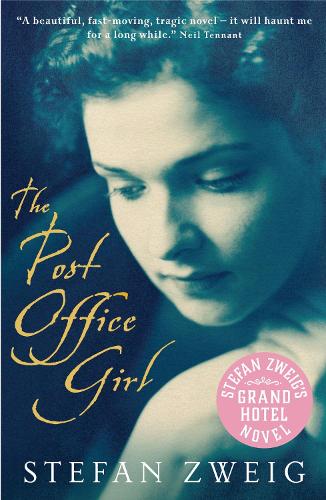
The Post Office Girl: Stefan Zweigs Grand Hotel Novel
(Paperback, Main)
Publishing Details
The Post Office Girl: Stefan Zweigs Grand Hotel Novel
By (Author) Stefan Zweig
Sort of Books
Sort of Books
4th May 2009
1st February 2009
Main
United Kingdom
Classifications
General
Fiction
Fiction in translation
833.912
Physical Properties
Paperback
288
Width 128mm, Height 208mm, Spine 22mm
243g
Description
A young Austrian woman, Christine, toils away in a provincial post office when, out of the blue, a telegram arrives inviting her to join an American aunt she's never known in a fashionable Swiss resort. She accepts and is swept up into a world of almost inconceivable wealth and unleashed desire. She feels herself utterly transformed. Then, just as abruptly, her aunt cuts her loose and she has to return to the post office, where - yes - nothing will ever be the same.
Christine meets Ferdinand, a bitter war veteran and disappointed architect, forced to work on construction sites. They are drawn to each other, just as they are crushed by a sense of deprivation, anger and shame. Inevitably their attempts at love look set to flounder until, in one desperate and decisive act, they find a way to remake their world from within.
Reviews
"Just finished reading this beautiful, fast-moving, tragic novel... it will haunt me for a long while." Neil Tennant (Pet Shop Boys website) 'Stefan Zweig was a late and magnificent bloom from the hothouse of fin de siecle Vienna...The posthumous publication of a Zweig novel affords an opportunity to revisit this gifted writer...The Post Office Girl is captivating.' The Wall Street Journal 'Zweig is one of the masters of the short story and novella, and by 'one of the masters' I mean that he's up there with Maupassant, Chekhov, James, Poe, or indeed anyone you care to name.' Nicholas Lezard, The Guardian 'A brilliant writer.' The New York Times 'I do think this is exceptional. There are scenes of hope and despair that are so lucid, powerful and alive. A classic.' Esther Freud 'A wonderfully convincing, atmospheric novel that shimmers with a strange conviction.' Eileen Battersby in the Irish Times 'A dreamy, ethereal symphony of Alpine beauty. Zweig shows himself to be a keen observer of the post-First World War scene, with an extraordinary capacity to depict the troubled psyche of his protagonist.' Paddy Kehoe, Book of the Week RTE Guide"
Author Bio
Stefan Zweig (1881-1942) was the most widely translated writer of the 1920s and 30s. A Jewish pacifist, he was driven by the Nazis into exile, first in London, then in Brazil, where he committed suicide in a pact with his wife. The manuscript for The Post Office Girl was found among his papers. Zweig's other novels include Beware of Pity and Chess Story.
